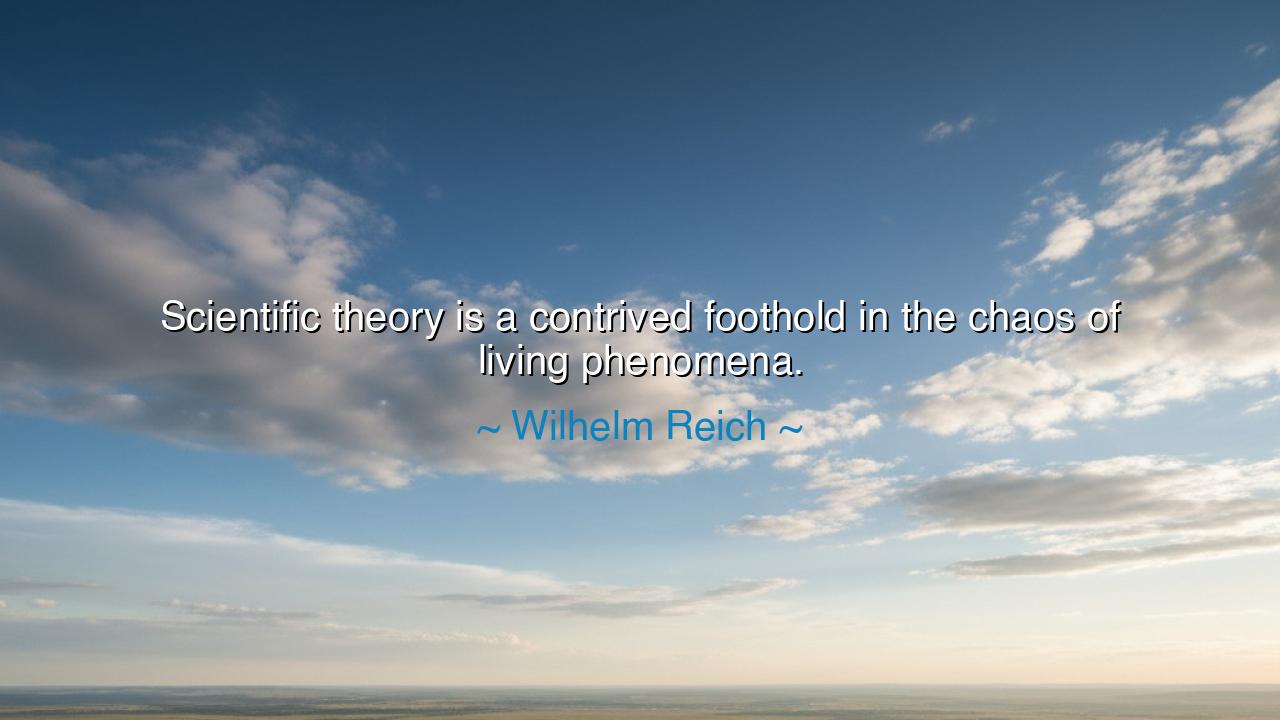
Scientific theory is a contrived foothold in the chaos of living






"Scientific theory is a contrived foothold in the chaos of living phenomena." These profound words from Wilhelm Reich express the essential tension between the order that science seeks to impose and the chaos inherent in the living world. Reich, a man deeply invested in both the scientific and philosophical worlds, understood that while scientific theory offers us a framework to understand the universe, it is ultimately a construct—a tool, a foothold—in the ever-shifting, unpredictable landscape of life. Just as a mountain climber uses a foothold to gain traction on a steep cliff, so too does science create theories to steady our understanding of the chaos of nature. Yet, despite its power to illuminate, science can never fully contain the vastness of life's complexity.
In the ancient world, the early philosophers often grappled with the same idea: how does one know the world, and how does knowledge relate to the ever-changing nature of the universe? The Greek philosophers were some of the first to attempt to make sense of this chaotic world. Heraclitus, for example, famously declared, "You cannot step into the same river twice." His observation spoke to the flux of existence, the constant change that defies static understanding. Science, in its search for permanent truths, often seeks to freeze the fluidity of life into categories and laws, but the world itself resists being neatly packaged. Like Heraclitus, Reich understood that science, though a valuable tool, cannot contain the totality of life's phenomena; it can only offer a temporary foothold in the chaos.
The story of Isaac Newton provides a historical example of how science tries to create order from chaos. Newton’s laws of motion and universal gravitation revolutionized our understanding of the physical world, providing a theory that could explain the movement of planets and the fall of apples. His discoveries were a contrived foothold, allowing humanity to make sense of the forces governing matter and motion. Yet, even Newton’s theories were eventually revealed to be incomplete when the quantum revolution of the 20th century shattered the idea of a deterministic universe. As much as science has illuminated our world, it remains only a tool for understanding, a temporary grasp on an infinitely more complex reality.
This tension between the known and the unknown continues to echo in the work of scientists today. Take the example of Albert Einstein, whose theory of relativity revolutionized our understanding of space, time, and gravity. Like Newton, Einstein’s theories provided a steady foothold in understanding the universe’s mechanics. However, the arrival of quantum mechanics demonstrated that even Einstein’s insights, though monumental, were limited. The deeper mysteries of subatomic particles and the unpredictability of their behavior pointed to a chaos that no single theory could completely explain. Einstein himself famously said, “The more I learn, the more I realize how much I don’t know.” This humility in the face of nature's chaos is what Reich points to—scientific theory may offer clarity, but it is always partial, never fully grasping the unfathomable complexity of the universe.
Reich’s words are a reminder that while science provides us with the tools to make sense of the world, it is not the final answer to the mysteries of life. He speaks to the limitations of the human desire to categorize, analyze, and dominate the natural world. The chaos of living phenomena—from the patterns of nature to the complexities of human emotions—cannot be entirely reduced to equations or laws. Science, in its most humble form, acknowledges its role as a guide, a map through the wilderness, but not as the territory itself. The beauty of the world lies not only in the patterns we can see and explain, but in the vastness of what remains beyond our understanding.
The lesson that Reich imparts is one of humility and respect. While we must continue to seek understanding through science, we must never forget that our theories are temporary constructs in the face of the vast and ungraspable chaos of life. Just as Heraclitus taught that change is the only constant, so must we recognize that science, though powerful, is always evolving and being refined. Every new discovery opens the door to even deeper questions, reminding us that the pursuit of knowledge is an eternal journey, never a final destination. Science, as Reich suggests, is our way of finding footholds in the chaos, but it is the mysteries we cannot explain that fuel the true wonder of the universe.
In our own lives, we should approach both science and life with curiosity and humility. Let us strive to learn, to question, and to explore the world around us with an understanding that our knowledge is always incomplete. Just as the ancient philosophers and scientists have sought to unravel the mysteries of existence, so too must we continue that quest, acknowledging the limits of our understanding while embracing the wonder that comes from facing the unknown. Whether in the pursuit of scientific knowledge or in the search for deeper meaning, let us remember that the chaos of life is both a challenge and a gift, for it is in the mystery that the true beauty of existence lies.






AAdministratorAdministrator
Welcome, honored guests. Please leave a comment, we will respond soon